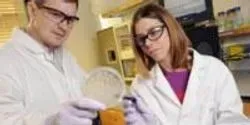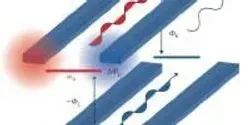News

Emily Hernandez didn’t wait until college to start recruiting fellow minorities to science, technology, engineering and mathematics (STEM) fields. She started as an eighth-grader during a University of Memphis camp called Girls Experiencing Engineering near her Germantown, Tennessee, hometown.

Imagine a balloon that could float without using any lighter-than-air gas. Instead, it could simply have all of its air sucked out while maintaining its filled shape. Such a vacuum balloon, which could help ease the world's current shortage of helium, can only be made if a new material existed that was strong enough to sustain the pressure generated by forcing out all that air while still being lightweight and flexible.

Carnegie Mellon University professor Keith Cook has received a four-year, $2.4 million grant from the National Institutes of Health (NIH) to support research and development of artificial lungs that patients may use long term in the comfort of their own homes while waiting for a lung transplant. Cook, an associate professor in the Department of Biomedical Engineering, will lead the project and collaborate with researchers from the University of Washington, Columbia University and Allegheny General Hospital in Pittsburgh.

A new class of synthetic platelet-like particles could augment natural blood clotting for the emergency treatment of traumatic injuries – and potentially offer doctors a new option for curbing surgical bleeding and addressing certain blood clotting disorders without the need for transfusions of natural platelets.

Astronomers searching the atmospheres of alien worlds for gases that might be produced by life can't rely on the detection of just one type, such as oxygen, ozone, or methane, because in some cases these gases can be produced non-biologically, according to extensive simulations by researchers in the NASA Astrobiology Institute’s Virtual Planetary Laboratory.

Meditation might be a path to migraine relief, according to a new study by researchers at Wake Forest Baptist Medical Center.

Scientists’ underwater cameras got a boost this summer from the Electron Microscopy Center at the U.S. Department of Energy’s Argonne National Laboratory. Along with colleagues at the University of Manchester, researchers captured the world’s first real-time images and simultaneous chemical analysis of nanostructures while “underwater,” or in solution.

Rigaku Raman Technologies, a leading pioneer of handheld and portable Raman spectrometers, will be showcasing its new generation handheld Raman analyzer for raw material identification (RMID) in booth 1C82 at CPhI Worldwide 2014 (7-9th October 2014. Paris Nord Villepinte, France). Progeny™ (http://www.rigakuprogeny.com) delivers improved performance, ease of use and confidence to ensure the industry’s most accurate and comprehensive range of material identification in a handheld form.













